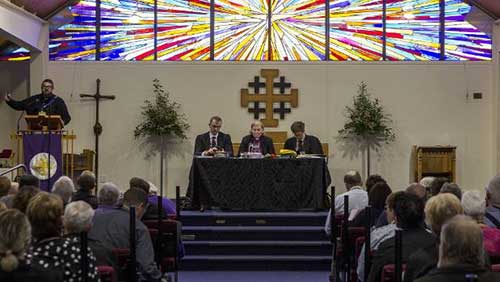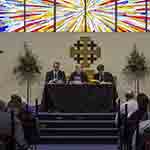
I remind especially new commenters here that the culture of this site is light over heat – no anonymous comments (unless in exceptional cases where your normal name would make you vulnerable); no ad-hominem comments. Remember, there are real people we are talking about, and real people reading what we write here.
On Saturday (3 March), the Christchurch diocesan synod met specially to discuss the latest proposal to allow for the blessing of committed same-sex couples. There was widespread surprise, on both “sides”, at the strong support in favour in the vote (laity 60-40; clergy 47-31). Bishop Victoria Matthews is quoted by Stuff as saying that the vote was a major surprise and that she had expected it to be defeated.
Next weekend, Nelson diocese meets in its synod about this. The Bishop of Nelson, Bishop Richard Ellena, is one of the members of the Working Group who produced their Report as a consensus document.
I think my strong advocating of equality for LGBTQI+ is well known. My own suggestions, however, to change the formularies in a simple manner or to use our approach to divorce and remarriage as a template for committed same-sex couples have garnered little political energy. I appreciated that my submission to the Working Group was acknowledged at the start of the debate. But, I am distressed that debate about this seems to continue round and round an Anglican cul-de-sac and not getting anywhere (I understand that letters about equality for gays began in the national Anglican newspaper in the mid 1960s, and meetings began debating this at synod in the late 1970s). Wouldn’t it be great if we could bring this energy to some other issues as well…
With a large number of speakers at the Saturday synod, we were not to repeat what a previous speaker had already said, only bringing forward new material, and to limit speaking to 3 minutes. This meant that those in favour of blessing committed same-sex couples, but unhappy about particular parts of the report that they wished were stronger or different, couldn’t reiterate the positives in the Report that had already been mentioned, and often only really had time to focus on those parts they hoped would be improved.
A few speakers still made the unhelpful distinction that those against blessing same-sex couples are following the Bible, and those who are in favour do so simply out of love, justice, or even just following current, ever-changing culture and our surrounding society. The majority, however, seem to have understood that (as, say, with divorce and remarriage) there are different ways to interpret the Bible – and that is the very reason we are in the place we currently are in this discussion. I am not going to debate the differences in biblical interpretations on this site, simply pointing those who wish to do so to such authors as Tobias Haller, Matthew Vines, and James Alison (highlighted by Dean Lawrence Kimberley in his speech supporting the motion).
The Report says it well:
What was equally clear is that the Christian people holding these very differing beliefs had prayerfully and diligently studied the scriptures and were invariably driven by their desire to do what was pleasing to God (page7).
In the time allotted to me, my three areas of concern were
1) That this had become so big in our Church’s self-understanding, that we are proposing networks of “Christian Communities” (under the heading of “Orders of Consecrated Life” in the Report) not for something like commitment to deep contemplative prayer or for undertaking a life lived sacrificially with poorer people, but solely on attitudes to committed same-sex couples.
2) Dependence on the authorisation of a rite by the bishop. Bishops have only been able to authorise services since a change for that in our Church’s Constitution came into effect in May last year. A bishop may balk at authorising such a rite if they understand it as being in breach of our Church’s teaching. The Report suggests a change to the canon that the bishop cannot be disciplined for authorising such a rite – but I cannot think of an example of authorising a rite in conflict with teaching. That is certainly not what is happening in the divorce/marriage parallel. And if the bishop doesn’t authorise a rite – we cannot bless a committed same-sex couple in that episcopal unit.
3) If General Synod Te Hinota Whanui (GSTHW) makes no changes to Title D, in which licence holders are required to be chaste – and chastity is understood as sex only taking place in heterosexual marriage – then the Blessing could make the already vulnerable even more vulnerable.
Let me invent an example to illustrate my point (3). A principal of an Anglican school (integrated or independent) holds a bishop’s licence for that position. Currently, such a principal must be chaste – with chastity understood as only having sex within heterosexual marriage. If such a principal is in a committed same-sex relationship, anyone can make a formal complaint under Title D, and I would be surprised if such a complaint did not successfully lead to discipline, the loss of employment for the principal, and flow on effects for the school. If such a principal has the relationship blessed, might not this blessing be adding even more vulnerability to this person? Including from someone who opposes such blessings in principle?
The Working Group stayed completely within its mandate (and I thank them again for working so hard on the impossible task they were set). But GSTHW, when it meets in May, needs to take note of the wider issues. If GSTHW does not clarify/alter chastity to include sex within a committed same-sex couple, how much value is the blessing?
Straight after the Christchurch vote, I began receiving messages from LGBTQI+ persons and their supporters. Many, of course, were positive about the vote. Many expressed the surprise that I noted earlier in this post. But there were also several who expressed how they continue to feel deeply hurt, impacted, angry, and vulnerable.
The previous proposal, Motion 30, was a more “progressive” way forward (see here). When no consensus was forthcoming at the previous meeting of GSTHW, it did not get put to the vote and is still lying on the table. In May, anyone at GSTHW seeking a stronger way forward may still seek that Motion 30 (still lying on the table) be put. GSTHW may, of course, accept, reject, or creatively alter any aspects of the suggestions in the Report.
Whatever happens, I think that debating committed same-sex couples will continue to be a mark of NZ Anglicanism for some time yet.
If you appreciated this post, consider liking the liturgy facebook page, and/or signing up for a not-very-often email, …
image source: STACY SQUIRES/STUFF




Sounds like a good start to me.
Something that stands out from this and another article: “would not be disciplined”. Let’s be having that in a positive tone please!!
This is an encouraging development.
The title D requirement seems to be:
10.4 CHASTITY:
Chastity is the right ordering of sexual relationships.
10.4.1 Ministers are to be chaste. Promiscuity is incompatible with chastity.
10.4.2 The sexual abuse of children is an utter disregard of humanity and a complete repudiation of the teaching of Christ.
“Right ordering” is not defined. The older view was ordered to procreation, but Vatican II introduced ordered to love and mutual affection.
“Chaste” is not defined but the implication seems to be to rule out public promiscuity, which of course a committed same sex relationship, by its very nature, would rule out.
This title does not seem to be a huge obstacle, but of course the devil is in the (mis)interpretation.
Many Blessings
Thanks, Chris. Yes, the devil is in the detail of a case in Auckland which went to the Human Rights Review Tribunal in relation to a charge that the church discriminated against a gay man who wanted to become a priest. There may be other examples also, but that’s the interpretation of “chaste” that springs to mind. Blessings.
Yes Bosco. I understand in the case you mentioned that there were other factor’s at play in the Bishop’s decision well beyond the mere fact that the man was gay. I do not think that his case ought to be interpreted as creating any sort of precedent for candidates to ordination merely because of their sexual orientation.
Many Blessings
Thanks, Chris. This is not the place to go into the details of that case, and I’m certainly not indicating the conclusion that you suggest some (ought not to) draw from it. All I was doing was pointing to what “chaste” is understood to mean in Title D. Blessings.